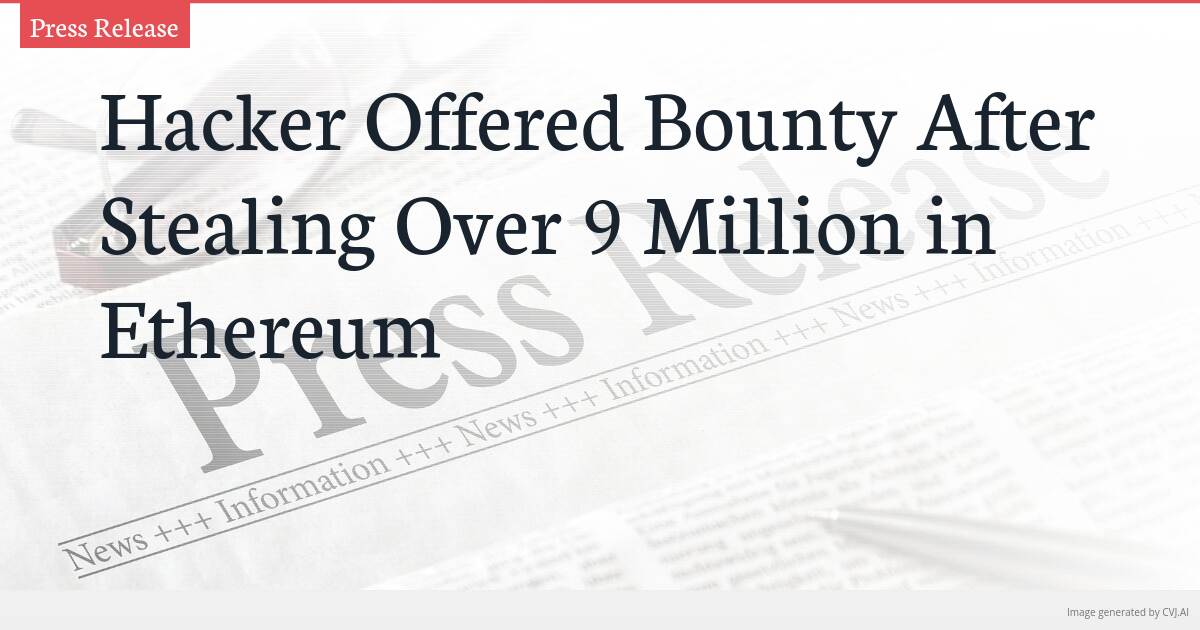This summary text is fully AI-generated and may therefore contain errors or be incomplete.
In a significant security incident, zkLend, a decentralized money-lending protocol on the Ethereum scaling solution Starknet, has announced a bounty for the hacker who stole over $9 million in assets. The protocol is taking proactive steps to recover the stolen funds by offering the hacker a chance to keep 10% of the stolen amount as a reward for returning the remaining 90%. This unusual approach underscores the increasing challenges faced by decentralized finance (DeFi) platforms in protecting user assets from malicious attacks.
Details of the Incident
The hacker, identified by zkLend, is being urged to return at least 90% of the stolen funds, which equates to approximately 3,300 ETH. In a public message on social media, zkLend stated, “To the hacker: We understand that you are responsible for today’s attack on zkLend. You may keep 10% of the funds as a whitehat bounty.”
The protocol has provided a specific Ethereum address for the return of the funds, emphasizing that cooperation could lead to the hacker being released from any liability related to the attack. As the situation develops, zkLend is collaborating with security firms and law enforcement to address the breach.
Urgency and Legal Implications
The protocol has set a deadline for the hacker to respond, warning of potential legal consequences if the funds are not returned by 00:00 UTC on February 14, 2025. This timeline highlights the urgency of the matter and zkLend’s commitment to recovering the stolen assets. Currently, the hacker’s wallet contains approximately $7 million in various crypto assets, including 2,551 ETH valued at around $2.75 million.
This incident raises important questions about the security measures within the DeFi sector and the ethical implications of offering bounties to hackers. While some may view this as a practical approach to asset recovery, others may argue that it sets a troubling precedent for future security breaches.
Broader Trends in DeFi Security
The zkLend incident is part of a broader trend of increasing vulnerabilities in the DeFi space. As more users turn to decentralized platforms for lending and borrowing, the potential for exploitation rises. The decentralized nature of these platforms often means that traditional regulatory frameworks are not easily applicable, making them vulnerable to attacks that can lead to significant financial losses.
This situation also highlights the ongoing debate within the cryptocurrency community regarding the ethics of hacking and the role of “whitehat” hackers. While some hackers aim to expose vulnerabilities and enhance security, others engage in malicious activities that erode trust in the ecosystem.
Implications for the Future
The bounty offered by zkLend may be seen as an effort to distinguish between these two types of hackers, but it also raises questions about the long-term implications for security practices in the industry. As the DeFi landscape evolves, the need for robust security measures and clear ethical guidelines becomes increasingly critical.
The zkLend breach serves as a stark reminder of the risks associated with decentralized finance and the importance of vigilance in protecting user assets. With potential legal action on the horizon, the outcome of this situation could significantly influence how DeFi platforms approach security and user trust in the future.
📎 Read the original article on dailyhodl.com


